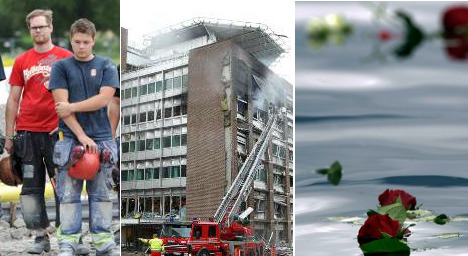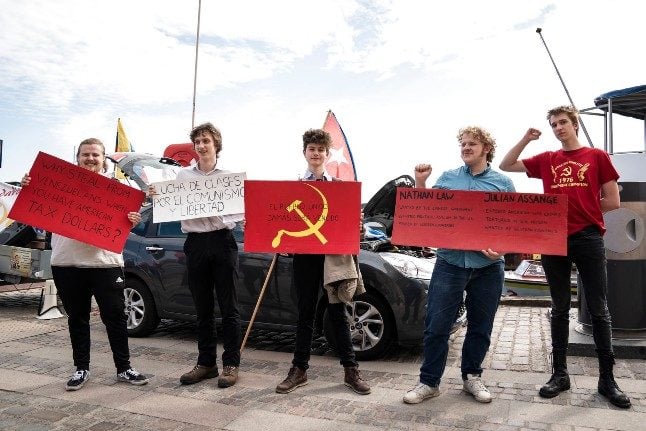The Swedish media has been producing reams of column inches since a 32-year-old man turned his apparent hatred of the Norwegian society in which he lived into a path of death and destruction in the worst terror attack in the country’s history.
The topics and analysis have of course been disparate, but common to all of the opinion pages in the major media outlets has been the theme that the attacks should not cause society to react by turning inwards and shutting the door to outsiders.
Katrine Kielos, writing in Sweden’s largest daily Aftonbladet shortly after the full scope of the horror of the massacre on Utøya became known, argues that “our openness must be cherished”.
“We are open, democratic and multicultural societies. Some may say that it makes us weak. That Norway is a naive country. Now the nightmare of terror has been turned against the part of the world which is least equipped to deal with the attack.”
“They are wrong.”
Per Gudmundson, writing in the Svenska Dagbladet (SvD) daily, argues that the open society would soon be lost if we heeded the call for security services to monitor every form of ideological extremism.
He continues to argue that the perpetrator of the attacks, while personally responsible, could not have carried them out “without either the daily contacts with the outside world or ideological sustenance from like-minded people” and urged a greater vigilance among citizens.
“When did you speak to your neighbour last,” Gudmundson rhetorically asks, pointing out that the perpetrator had long circulated in extreme-right circles and had sent out several signals “that all was not as it should”.
The Sydsvenskan daily followed a similar theme, arguing that the police and broader society shoulder some responsibility for not having noted the man’s oft publicised political convictions and years of preparation for the attacks.
“But the sad truth is that an open society can never guarantee that violent acts are not repeated. However, more must be done to mitigate the consequences,” arguing that the police response was not good enough.
“Preparedness must be improved, the response must be faster. Only then can an open society protect its population.”
The Expressen daily was among those commenting on the ideological climate of debate in Sweden and how the killer’s identity as a white, blonde right-wing extremist struggled to fit in with the perceived picture of a terrorist among Sweden’s far-right.
Kent Ekeroth, one of the Sweden Democrats 20 members of parliament, has courted controversy both within the party and outside for comments made on Twitter in the immediate aftermath of the attack.
Expressen highlights several posts by Ekeroth where he draws the conclusion that the attacks were perpetrated by Muslim extremists and then continues to demand his right to “make a political issue” out of it.
“Kent Ekeroth is not alone in abandoning political and collectivist language and switch to an individual and psychological, when he learns that the perpetrator is Norwegian. “Maniac”, “madness,” “maverick” and “tragedy” were far more common words today, than “terrorist”, “terrorist attack” and “extremism”.
The Sweden Democrats have since complained that, due to expressed similarities in their underlying political ideology, they are being made guilty by association with Behring Breivik.
The Dagens Nyheter (DN) daily also wrote on the theme of the public discourse, both in terms of its tone and in its defence.
“We always have the same debate when something horrible happens in someone’s name – an ideology, a religion, a world-view. It was your rhetoric, your discourse, while admittedly milder, that caused the attack and indirectly contributed to the deaths.”
The newspaper warns that arguments such as these render it impossible to express a single opinion.
“Too much self-censorship can cause considerable damage for freedom of speech and thus democracy.”
But, DN warns, the tone of the public discourse “has importance, words carry weight”.
“All who participate in the public debate – in political debates, on internet forums, in letters to the editor columns – are personally responsible for keeping the discussion on a dignified, civilized level. The terrorist, even if he is called a “lone lunatic”, is however rarely alone. He comes from a culture, a context…”
The last word is far from said or written on the terror attacks which have left a country in mourning and a continent searching for answers. But what is abundantly clear is that the defence of the “open society” in Scandinavia, naive as it may seem to some, is as vehement as ever.
Where the main newspapers stand:
Dagens Nyheter, “independently liberal”, Stockholm-based, owned by the Bonnier family.
Svenska Dagbladet, “independently liberal-conservative”,
Stockholm-based, owned by Norwegian media company Schibsted.
Sydsvenska Dagbladet (Sydsvenskan), “independently liberal”, Malmö-based, owned by the Bonnier family.
Aftonbladet, “independently Social Democrat”, Stockholm-based, owned by trade union federation LO and Norwegian media company Schibsted.
Expressen, “independently liberal”, Stockholm-based, owned by the Bonnier family.



 Please whitelist us to continue reading.
Please whitelist us to continue reading.
Member comments